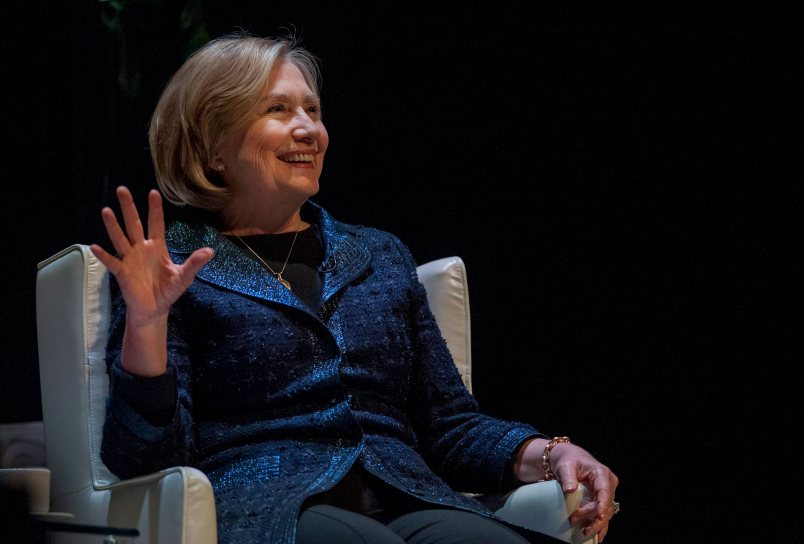Now that Hillary Clinton, former First Lady, Senator and Secretary of State, has officially declared her presidential candidacy, we should note what seems likely to be an all but unprecedented aspect of this campaign. The dynamics and debates which usually play out in a presidential primary between candidates look likely to play out within the Clinton candidacy itself.
To a degree I mean within the campaign itself, with the accustomed battles between political operatives and policy advisers on her campaign over strategy and ideology. But this is not principally what I mean. I mean the Clinton candidacy as a public discussion and quasi-election among Democratic partisans nationwide. One might even say that the Clinton candidacy itself is now close to coterminous with the nominating process and even the Democratic party itself.
Now, having said this, I know there are lots of Democrats who would prefer to see another nominee or at least some more candidates in the race who could make an actual contest of it – either for ideological or characterological reasons. I myself, a Clinton diehard in the ’90s, have noted the element of dread I feel at the return of the drama that seems to accompany the Clintons wherever they go. But it now seems highly unlikely that Hillary will draw a genuine challenger, even one who could create an organized contest, let alone pose any serious threat to her nomination.
Elizabeth Warren – who once ran her own blog at TPM! – is the logical person to challenge Clinton from the left. But she could really not be clearer about not being a candidate. I suspect the biggest reason is that on a personal level she does not want to run for President – something that is unlikely to change. Even if she had no intention of running she could at least hint at the possibility simply to keep her issues at the forefront of the campaign discussion and nudge Clinton in her ideological direction. But she’s not. She almost certainly will not run.
There are others. Bernie Sanders might run. Martin O’Malley clearly wants to run and Jim Webb might. But none of these have the prominence or ability to build a coalition – at least for now but likely at any time in this race – to stand a chance to block or even realistically challenge her nomination.
It’s true that Hillary seemed unassailable in 2008 too. But the situations are not comparable. As prohibitive as she seemed, Clinton had a number of quite realistic challengers. John Edwards was a former Senator who had been the vice presidential nominee four years earlier. The self destruction that would end his public career was as yet unknown. Barack Obama was only four years into his first term in the Senate. But he was already a star in the Democratic party after his 2004 convention speech. And as we noted a few days ago, Barack Obama is the exception not the rule. Even beyond these two Joe Biden and Chris Dodd were sitting senators and plausible candidates. There’s nothing and no one comparable today. The Iraq War, on which she had taken a vote at odds with the impassioned views of many Democrats, is still out there as a challenge for her. But it was far more salient in 2008 than it is now.
There is a vast Hillary wing of the Democratic party, with big support from various constituency groups, interest groups, operatives, not to mention millions of Democratic partisans. And though the antipathy between the Obama and Hillary wings was stratospheric in 2008, she significantly muted, if not quite extinguished it by serving ably and loyally in his administration.
All of which bring us to the present point in which it is difficult to see anything but a game changing mistake or scandal standing in her way. Because of this all the issues that get hashed out in a primary process – ideology, the future of the party, the ordering and power of constituency groups within a party, political strategy and more – are being played out within her candidacy. So the question is becoming not whether Hillary should be the nominee but what sort of nominee you think she should be. Constituency groups are not sizing up different candidates but trying to define what a Hillary Clinton candidacy and presidency would look like. Al Gore’s candidacy in 2000 had some elements of this. Bill Bradley was his only real challenger. His campaign didn’t have the resources or the candidate to make it a credible one. And Gore, in good ways and bad, was essentially running against himself.
Just today I noticed a report that New York City Mayor Bill de Blasio, who made an early mark as Clinton’s campaign manager in 2000, praised Clinton but declined to go as far as endorsing her, saying he wanted to see her put forward a “vision” for her campaign. I don’t put any huge importance on de Blasio’s mild demurral. It’s just a news item I saw as I was writing this post. It’s probably a mix of the internal dynamics of New York City politics and his own role as a key figure on the left of the Democratic party. But it seems likely to be a pattern for the left of the party – not actually challenging her candidacy but mildly holding out to shape her candidacy and press her to address the issues that animate the left of the party.
We’ve never seen anything quite like it.






